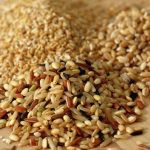
In the quest for more plant-based protein sources, yellow peas have been getting a lot of good press. And the number of packaged foods enhanced with this “pea protein” has tripled in the last few years. But dried split peas, whether yellow or green in color, were an excellent food choice long before they achieved their overnight superstar status. A mere quarter-cup, measured dry (uncooked), will yield 11 to 12 grams of protein, 13 to 16 grams of fiber and just 180 calories. Tip: Read labels on bags of dried peas since these counts vary slightly. Peas are common legumes or “pulses.” While not a complete protein, like meat or chicken, peas have important amino acids including isoleucine, leucine and valine, needed for building muscle. Keep in mind that foods with just the pea protein extract are missing yellow peas’ fiber, B vitamins and a wide variety of essential minerals and phytochemicals. So rather than paying up for products with added pea protein, especially if it’s the only healthy ingredient in the box, consider adding whole split peas to your diet with meals you make at home. Dried peas are perfect for do-ahead meals. Take a few minutes to cook up a batch, and then use them in recipes throughout the week. They form the base of many Indian dishes and hearty soups. They can… read on >



























-300x200.jpg)







-300x169.jpg)
